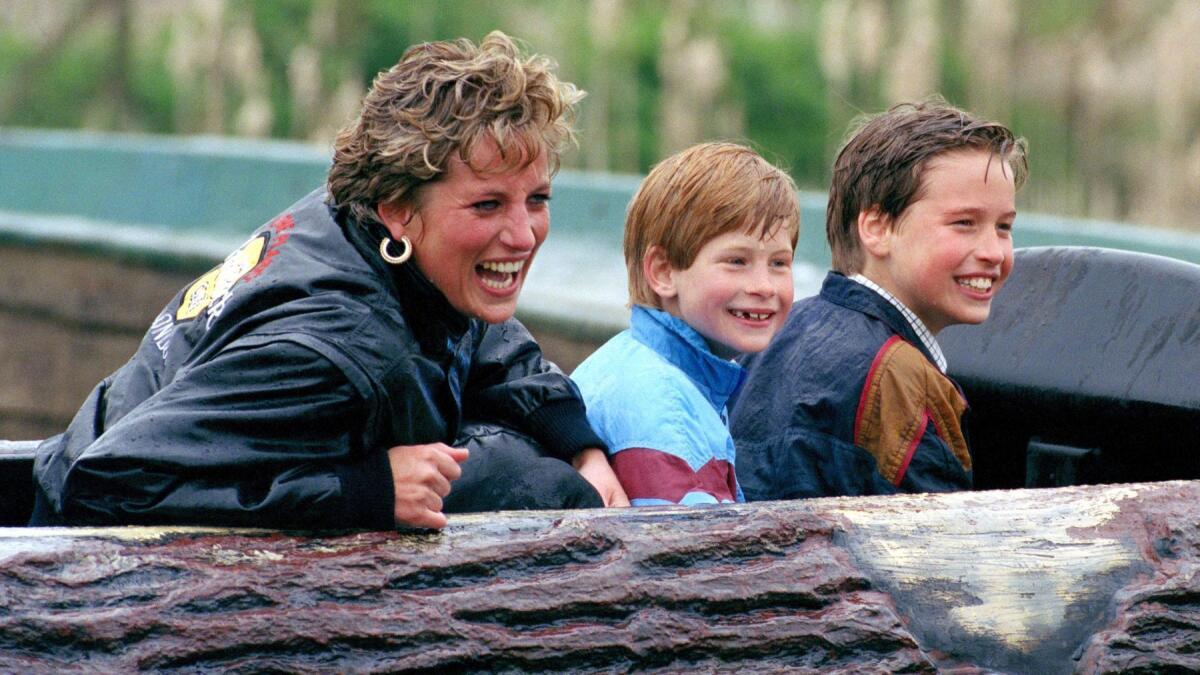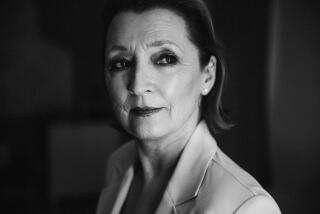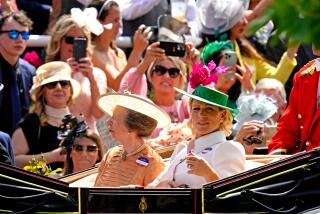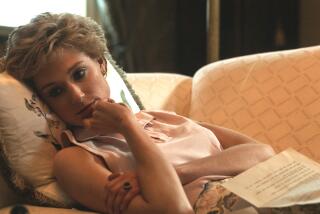Review: ‘Diana, Our Mother: Her Life and Legacy’ offers no digging or analysis, but is moving all the same

To mark the 20th anniversary of the death of Diana, Princess of Wales, her sons, Princes William and Harry, have joined in a documentary remembrance, “Diana, Our Mother: Her Life and Legacy.”
Premiering Monday on HBO, it’s a big love note from family, friends and others who came close within the circle of her radiance. It makes no attempt to be a complete portrait, but rather concentrates on her goodness and good works, as a person and a public figure. There is sadness in it, but no scandal. (If you need dirt, there is an ABC special, “The Story of Diana,” coming in August that may dish some; we have already had the same network’s “The Last 100 Days of Diana,” back in May.) I am good with this version.
If you weren’t around in Diana’s time, the scope of her impact might be hard to understand; Kate Middleton is small potatoes by comparison. But after Queen Elizabeth II — the lady “The Crown” is about — Diana was the late 20th-century royal that mattered. There is a tragic arc to her life, if you care to focus on it: abandonment by her mother, failed storybook marriage to a man to whom she seemed temperamentally unsuited, death in a car crash at 36 on the run from paparazzi. At the same time, she made the most of the platform fate provided her, using her acquired position and natural charisma to advocate for the homeless and for AIDS victims, to campaign against land mines and more.
At a time when any person living with HIV was treated like toxic sludge, she went into hospitals and hospices and took their hands. “Most people want to get away from pain,” says landmine activist Jerry White, who accompanied Diana to Bosnia-Herzegovina weeks before her death. “They can’t listen to pain, they can’t be fully present, in the presence of pain, and the Princess of Wales could be there.” Empathy was her superpower.
From her children, brother, old friends, activist allies, lady in waiting, royal photographer, gardener, stylist and Elton John, we learn that she was funny, fun-loving, cheeky, naughty, “a total kid through and through” (says Harry), “extremely good at showing her love” (says William), sensitive, vulnerable, a dreamer, a teenage reader of romance novels. She was like the young girl in an old movie who brings light and life into an old, dark house. She made sure her kids tasted normalcy, says Harry, whether “taking us for a burger every now and then or sneaking us into the cinema, or driving through the country lanes with the roof down on her old-school BMW listening to Enya.”
“Diana, Our Mother” is not so much sanitized as specific. It chooses where to look. Prince Charles is barely present: We see him at their wedding; in a brief sequence of photos midway through the documentary representing the collapse of the marriage, and at her funeral; her mother-in-law, the queen, is a blip expressing concern for Diana in a third-party remembrance. Nothing of Diana’s love life before or after Charles is mentioned, only that, in the words of old friend William van Straubenzee, “Everybody in the world was in love with Diana; every person of every age group of any sex or domination or anything that knew of her was in love with her.”
There is no digging, no analysis, and apart from some mild swipes at the tabloid press, no blame. Even her death flies by, compressed into an image of the Eiffel Tower, a few out-of-focus lights and the low-volume sound of press reports. What matters here is the massive outpouring of public grief that followed: “Her humanity spoke to their humanity,” says Lord Victor Adebowale, who worked with her on homelessness issues, “regardless of the difference in class, in life experience.”
If it does have the burnished, nonstick surface of an “authorized” document — not quite a promotional piece, but not entirely not one — the film is authentically moving all the same. Early home movies and informal family snapshots — the princes go through one of their mother’s albums together — are poignant in the ordinary ways. We all start as children, time brings complication, life is fleeting. Celebrities are, or were, people too.
William and Harry, who have variously inherited Diana’s characteristics and causes — from a distance, at least, they seem more their mother’s sons than their father’s — were 15 and 12, respectively, when she died. In a small but significant way, “Diana, Our Mother” is about their belated processing of grief — what the kids couldn’t share with the millions 20 years ago. Harry speaks of “shutting it out, locking it up” and “a whole period of just trying to sort myself out” that you can read about on his Wikipedia page. William says, “I kept saying to myself that my mother would not want me to be obsessed.”
They are getting past that now. The stiff upper lip trembles.
‘Diana, Our Mother: Her Life and Legacy’
Where: HBO
When: 10 p.m. Monday
Rating: TV-G (suitable for all ages)
Follow Robert Lloyd on Twitter @LATimesTVLloyd
ALSO
Netflix’s ‘The Crown’ is a winning tale of royals and the weight of tradition
The fashion legacy of Princess Diana is the subject of an exhibit in London
Prince William talks about ‘taboo’ of mental illness and death of Diana in new interview
More to Read
The complete guide to home viewing
Get Screen Gab for everything about the TV shows and streaming movies everyone’s talking about.
You may occasionally receive promotional content from the Los Angeles Times.







